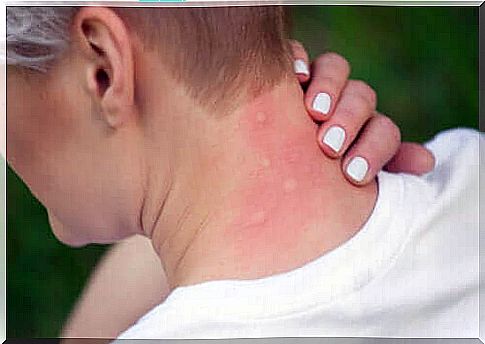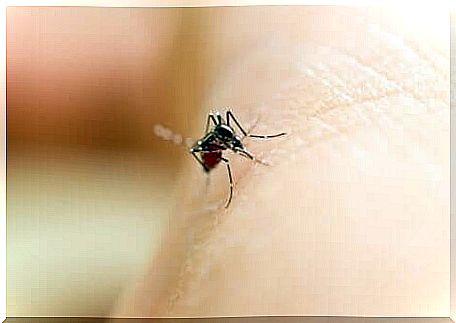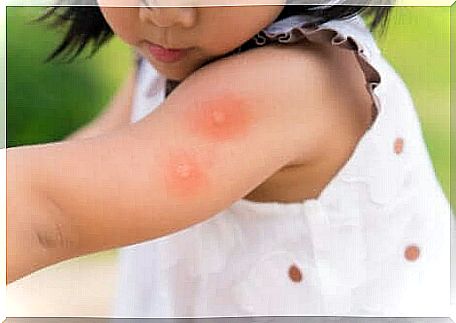Everything You Need To Know About Mosquito Bites

Mosquito bites are troublesome to deal with, they are red, itchy and it can take a long time before they go away. While mosquitoes may seem more annoying than anything else, they are actually capable of transmitting several diseases. Learn more about mosquito bites in this article!
Dengue fever, malaria, zika virus, West Nile fever and chikungunyavirus disease are just some of the mosquito-borne diseases these insects can spread to humans. In this article, we will share with you all the details about mosquito bites: why they sting, who they sting, and how you can reduce the risk.
All about mosquito bites: Why do mosquitoes sting?
Before we get started, we should clarify that not all mosquitoes sting. There are about 3,500 types of mosquitoes, and only three of them suck blood: Anopheles, Culex and Aedes .
Likewise, this number shrinks even more when we consider that only female mosquitoes sting. Females need proteins to produce and lay eggs, so they suck our blood to satisfy their nutritional needs.
In general, a female mosquito can lay between 30 and 300 eggs after a single feeding. To produce more eggs, she needs to drink more blood.
Male mosquitoes do not sting because they get the nutrients from nectar and other fluids from plants. Females can live without drinking blood, but the three species mentioned above need it to reproduce.

All about mosquito bites: Why do mosquito bites itch?
When a mosquito bites you, it penetrates the skin with a sharp tip in its mouth and injects saliva into the area. This stops the blood from coagulating and allows the mosquito to suck the blood more efficiently. Your immune system reacts to the chemicals in the insect’s saliva, which can cause various reactions, such as redness, swelling and itching.
Although these symptoms are some of the most common, children, people with weakened immune systems and adults who have not been stung by mosquitoes before, tend to have stronger reactions to mosquito bites. These more severe symptoms may include fever and chronic urticaria.
All about mosquito bites: Do mosquitoes prefer some people over others?
As unfair as it may be, the answer is yes, mosquitoes have preferences. Some studies suggest that 20% of the population is irresistible to mosquitoes. Similarly, entomologists have discovered other factors that may make you more attractive to these insects.
Read below about some of the most common factors that can make you a mosquito’s favorite snack.
1. Color of clothes
Mosquitoes use sight to find their prey. Studies have found that they are more attracted to darker colors such as black, green and red. In other words, if you wear these colors, you will probably be the target of many mosquito bites.
2. Blood type
As we mentioned earlier, female mosquitoes depend on the proteins found in the blood to produce eggs, so it is not surprising that they prefer certain blood types. In one study, entomologists observed that people with blood type O are twice as attractive to mosquitoes as people with blood type A, while those with blood type B are least preferred by mosquitoes.
3. Carbon dioxide in the breath
Mosquitoes are able to smell the carbon dioxide we emit when we breathe. Thus, the more we exhale, the more vulnerable we will be to mosquito bites. That said, make sure you prepare to fight mosquitoes the next time you go hiking or jogging outdoors.
This explains why you often hear the mosquitoes’ incessant buzzing around your head, they are attracted to your breath!
4. Chemical composition of blood and body temperature
Mosquitoes can also detect their prey by smelling lactic acid, uric acid, ammonia and other blood components that are released in sweat. In addition, these insects favor people with higher body temperatures.
In this way, maintaining an active lifestyle can actually make you more prone to mosquito bites due to higher amounts of lactic acid in the blood and higher body temperature. However, genetic factors play a role in how much uric acid and other components are excreted in the blood.
5. Bacteria on the skin
Scientific studies have shown that the type and amount of bacteria present on the skin can make us more prone to mosquito bites. The most irresistible prey are those with a higher amount of certain types of skin microbes.
This may help explain why so many mosquitoes flock to the feet and ankles, as this area is a gathering place for bacteria.
6. Pregnancy
Studies show that pregnant women are more likely to be stung by mosquitoes than non-pregnant women. This is because women during pregnancy release about 21% more carbon dioxide and body temperature is significantly higher.
7. Drinking beer
A study from 2002 associated alcohol consumption with more frequent mosquito bites. Researchers concluded that people who drank beer were more tempting to mosquitoes than their colleagues who had not drunk beer.

All about mosquito bites: Can mosquito bites be prevented?
While there are some things you simply cannot change to avoid being bitten by mosquitoes altogether, there are some steps you can take to limit how much they bother you. And even better, reduce the risk of getting a mosquito-borne disease. Here are some quick tips to avoid mosquito bites:
- Use insect repellent.
- Wear long sleeves, pants and socks whenever possible.
- Choose clothes with light colors.
- Avoid going outdoors at dawn and dusk, as these are the most active hours for mosquitoes.
- Keep the patio free of places where mosquitoes can lay eggs, such as anywhere with stagnant water.
- Try to prevent mosquitoes from entering your home.
Some people are more vulnerable than others
Of the 3,500 types of mosquitoes that exist, only three suck blood. Furthermore, only female mosquitoes bite to get the nutrients needed to produce and lay eggs.
Again, some people are more attractive to mosquitoes than others. Among these groups are pregnant women, beer drinkers, people with blood type O, people who like to exercise, and people with certain types of bacteria on the skin. Although some of these factors are not easy to change, you can minimize the risk by following the advice above.









